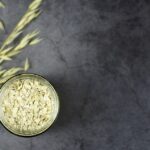A gluten free lifestyle requires more than just being aware of the types of foods you consume – you also need to monitor the drinks you have. Gluten-containing ingredients are often used in alcoholic beverages, making them unsafe for people with wheat allergies, celiac disease, or gluten intolerance.
The following is a list of the most commonly consumed alcoholic beverages, including spirits, hard liquor, wine, beer, and more. What liquids are safe to drink and which can be used when cooking if you’re trying to avoid gluten?
What is gluten?
Gluten is a protein found in wheat, barley, and rye products. It can cause serious problems for people with celiac disease, who must follow a gluten-free diet. People with celiac disease can’t digest gluten proteins. You can also be allergic to wheat, barley, or rye. People have different sensitivities to gluten. Some people cannot eat gluten because it causes problems with their digestion or because they have an autoimmune condition that is aggravated by gluten.
Is alcohol gluten free?
The short answer is: It’s complicated. Some types of alcohol are naturally gluten free, such as wine or rum. Other types of alcohol are made gluten free through the distillation process. These are distilled alcohols, which are made by a process of distillation that can remove gluten from the fermented grain. There are types of alcohol that will always contain gluten because they are distilled from fermented grain. Companies are now making more types of alcohol that are gluten free.
When choosing a gluten-free alcohol, be sure to check the ingredients and distillation process. If you have any doubts about the ingredients or processes a company uses, make sure to contact the brewer directly.
FDA Ruling on Gluten Free Alcohol
The FDA has published a new requirement to clear up any confusion in the liquor stores about which types of alcohol can and cannot be labeled as gluten free.
However, it is now understood that this test is not sensitive enough to accurately determine the gluten content in a drink Recently, it was determined that a test used to determine if a drink was gluten free was not accurate. The test was not sensitive enough to accurately determine the gluten content in a drink.
The FDA reiterated that it knew of “no scientifically valid analytical method effective in detecting and quantifying with precision the gluten protein content in fermented or hydrolyzed foods in terms of equivalent amounts of intact gluten proteins.”
The FDA wanted to create more options for people who are on a gluten-free diet. First, they cleared up the confusion around gluten-free sources.
As of October 2020, any food or drink claiming to be gluten free must have a gluten free main ingredient, before fermentation or hydrolysis can take place. This means that if a food has a gluten free claim, the company must have records that show that the ingredients used in the food are gluten free before fermentation or hydrolysis.
This means that the manufacturers must take measures to prevent any contamination of the product during the manufacturing process. You can receive a gluten-free alcohol label by following these steps.
However, the evidence for gluten-free labeling was found in the distilled alcohol.
Treated for Gluten Free
This means that the FDA now approves of companies using the label of “processed or treated or crafted to remove gluten” for beverages that do not meet the label requirements for certifying gluten free. The company needs to be able to share a description of the method used to remove gluten from the product in order to be granted this label.
The company can use enzymes or just the distillation process to make alcohol that does not contain gluten. If a product is labeled as “gluten free,” it means that the product does not contain any gluten. However, if a product has been treated, processed, or crafted to remove gluten, this information must be stated on the label.
The FDA states that this requirement does not mean that any results from the purpose can support a gluten free claim.
Distilling Process
Many types of alcohol are safe for people with celiac disease to consume because the gluten protein is removed during the distillation process. The gluten concentration is less than 20 ppm, making the item gluten free.
The FDA bellows that as long as good manufacturing practices are followed to prevent the introduction of any gluten-containing material into the final product, “gluten-free” claims on distilled products from gluten containing grains are allowed.
There are some people in the gluten free community who have a severe gluten intolerance and are still sensitive to even small amounts of gluten. This depends on you and your body and what you consider tolerable.
You should never drink alcohol made from wheat if you have a wheat allergy because even though the gluten is removed, the allergen remains.
You will need to be careful of additives in drinks that could make them unsafe, as well as cross contamination that could occur during the manufacturing process.
The following ingredients and processes are from the time of publication This information is from the time of publication and companies change their ingredients and manufacturing processes all the time. Although this list is accurate when writing, it is subject to change at any time due to the ever-changing policies of companies. You should do your own research and contact any companies whose drinks you are unsure of to find out if their drinks contain gluten.
So, is alcohol gluten free?
Yes and no. If you have a severe gluten intolerance, celiac disease, or a severe wheat allergy, I do not recommend drinking any alcohol that has had the gluten removed in the distillation process or with an enzyme. It is not possible to guarantee that the alcohol is safe for consumption.
If you’re not sensitive to gluten, you should be fine to drink these beverages.
This all depends on your body and what you find tolerable.
Gluten-Free Options
Beer, Wine, Cider, and Sake
If you have celiac disease or non-celiac gluten sensitivity, or are following a gluten-free diet for other health reasons, you need to avoid gluten entirely. The issue of not drinking alcohol often comes up when someone offers you a beer. The majority of beer is made from gluten grains such as barley, wheat, and rye.
All conventional beer is off-limits.
Gluten-Free Beer
Recently, manufacturers have started to produce a lot of different kinds of gluten-free beer. The beers on this list are all gluten-free, meaning they were made with gluten-free grains like sorghum, millet, and rice instead of wheat, barley, or rye.
Redbridge beer, which is gluten-free, is often available at restaurants and bars, especially those that also have a gluten-free menu. BEERS WITHOUT GLUTEN There are many beers without gluten on the market today. Some popular options are Bard’s, New Grist, New Planet, and Greens.
Gluten-Removed Beer
There are also beers being marketed as “gluten-free” to people who cannot have gluten, such as Omission and Estrella Damm Daura. Even though these beers say they are gluten-free, people on a gluten-free diet should be careful when drinking them.
The gluten protein in barley is broken down by an enzyme, but not removed. This creates a special barley that is used to make these products. Many people report bad reactions to gluten-free beers, even though experts have questioned the accuracy of gluten testing on these beers.
Wine
So long as you avoid beers, you should be safe consuming wine on a gluten-free diet. You should be cautious when drinking wine that contains added flavorings, such as fruit flavors and spices. You should double-check the ingredients to make sure you are not allergic to anything. This means that wine coolers are not good for people who have gluten allergies.
Hard Cider
There are many brands of gluten-free hard cider, such as ACE Cider, Crispin Cider, and Woodchuck Cider. However, other beers made without wheat, including malt beverages, hard lemonade, and energy drinks, still contain barley malt and are not gluten-free.
Sake
Sake can be problematic . Mochi may be made from a gluten-free grain, but it may still contain traces of barley. Some manufacturers also add a small amount of alcohol that is distilled from gluten grains to their sake recipes. If you’re interested in trying sake, you should start with one that’s junmai or junmai-shu. These labels indicate that the sake is made from pure rice.
Rum and Tequila
P rum is generally considered safe for people following a gluten-free diet. In almost every instance, rum is gluten-free. Some flavored and spiced rums are exceptions to this rule. If you want to know if a rum is gluten-free, you’ll need to contact the manufacturer.
Although rum on its own does not contain gluten, be careful of premixed drinks which are designed to be used with rum, such as those for making piña coladas. Some of these contain gluten ingredients as flavoring. If you are unsure, contact the manufacturer or make your own piña coladas using coconut cream and pineapple.
Tequila made from the blue agave plant in the traditional way is naturally gluten-free. However, some cheaper brands are not entirely made from the blue agave plant. There’s a small possibility that these could contain gluten. You’ll need to contact the manufacturer to ask.
Grain Alcohol
Different types of hard liquor, including vodka, bourbon, gin, and whiskey, can be made by distilling gluten grains. Even though some people say that alcoholic beverages that have been distilled don’t contain the gluten protein that causes bad reactions, you should know that some people still get sick from drinking alcohol that has been distilled from gluten grains. You should be careful and proceed with caution until you know if you are one of the people who have a reaction to it.
Here’s what the experts have to say about drinking alcohol distilled from gluten grains when you have celiac disease or gluten sensitivity:
- The National Celiac Association writes, “Distilled alcohol, even if it is made from a gluten-containing grain, such as wheat, rye, or barley, is considered gluten-free. This is because if an alcohol is distilled, proteins from the starting materials that provided the starch or sugar are removed in the distillation process.”
Distilled Alcohol
No study has looked at whether people with celiac and gluten sensitivity can drink alcohol distilled from gluten grains without being harmed. Some people who have a sensitivity to gluten have reported problems with gin, whiskey, and gluten-based vodkas, while others have not.
If distillation is done correctly, all gluten should theoretically be removed. Grain alcohols, or alcohols that are made from grain, are not distilled as many times as, say, vodka, which can be distilled up to six times. After distillation, some people add a little of the grain “mash” (which does contain gluten) to improve color and flavor. There is always a possibility of cross-contamination with gluten grains in the manufacturing facility.
There is a belief that small pieces of the gluten protein can remain after distillation- even when done correctly. It is possible that people who have an immune system sensitivity to gluten can identify these fragments.
There may be something else in the grain, beyond the gluten protein, that is not eliminated during distillation and causes a reaction in sensitive people.
Gluten-grain-based alcohol products may be safe according to experts, but some people say they experience serious gluten symptoms after drinking them. Although no studies have shown that distilled spirits cause severe reactions, this does not mean that they are safe. You should be careful when trying alcoholic drinks that are made from gluten grains if you have just been diagnosed with gluten sensitivity. Start with small sips of water and be mindful of any reactions.
One symptom of the virus is extremely fast intoxication and then a hangover that is much worse than usual. This means that if you drink a lot of alcohol made from gluten grains and have a terrible hangover the next day, you may not be able to tolerate alcohol made from gluten grains.
Mixed Drinks and Liqueurs
This is unfortunate because many mixed drinks are off-limits for those who cannot have gluten. In fact, most popular cordials and liqueurs are made with gluten ingredients and distilled grain alcohol made from wheat or barley.
However, Kahlua products may contain gluten because they are blended with vodka that is distilled from wheat, a gluten-containing grain.” The website for coffee-flavored liqueur Kahlua says that while distilled drinks are typically gluten-free, their products may contain gluten because they are blended with vodka that is distilled from wheat. Kahlua Original and the Kahlua flavors do not include any known gluten ingredients. However, Baileys Original Irish Cream notes on their website that while the product is produced with ingredients that do not contain gluten, they cannot guarantee the product is gluten free.
Drambuie contains gluten grain-based scotch whiskey as well as honey, but is considered to be gluten-free by the manufacturer. Even fruit-flavored liqueurs and other products often include alcohol that is distilled from gluten grains (generally wheat).
Cointreau is an exception to this rule because it is an orange liqueur. It’s made by distilling orange peels. Grand Marnier is a gluten-free alternative to other orange-flavored liqueurs that are made from brandy and cognac. Cocktails made with vodka may be a safe choice, since most bars carry at least one brand of vodka made from potatoes. Be sure to use gluten-free mixers as well.



